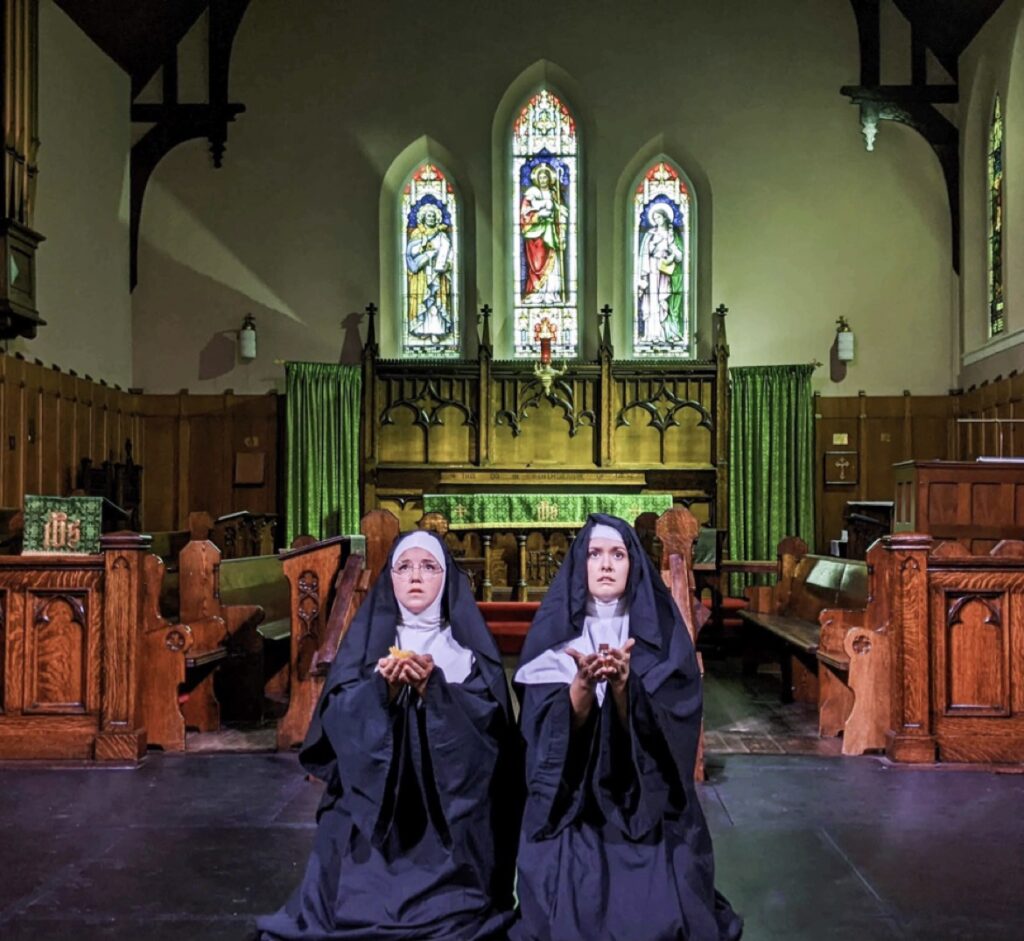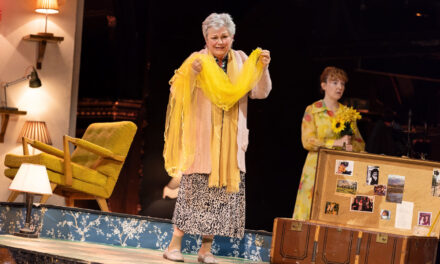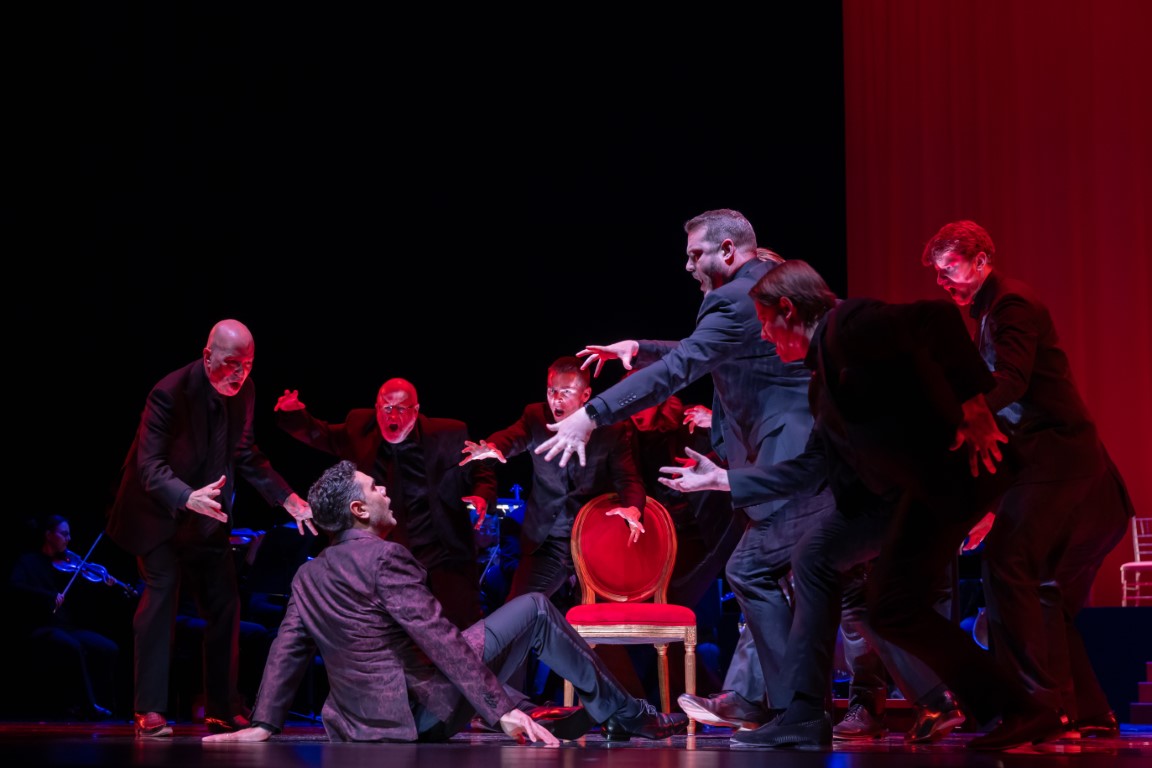Pop Goes the Opera produce as unpretentious and sincere a production of Puccini’s opera as one could wish for, in the ideal setting of Holy Trinity Anglican Church

Photo: Tim Lo, edited by Ruth Wong-Miller
Puccini: Suor Angelica
Director Ron Long
Conductor Graham Fast
Holy Trinity Anglican Church (101 St and 84th Avenue)
Reviewed performance: Saturday, August 13, 2022
Further performances:
Tues, August 16, 6 pm
Thurs, August 18, 7 pm
Fri, August 19, 8 pm
Sat, August 20, 2.15 pm
Sun, Aug 21, 2.15 pm
As the terrible harridan that is the Princess descends on her niece Angelica, confined to a nunnery on the family’s orders, Angelica pleads for information about her 7-year-old son. She invokes the memory of her mother, the Princess’ sister.
The Princess turns on her. “You bring your mother into this against me? You dare to mention your mother’s name?” she fulminates. “…Often…my spirit seems to leave me and join your mother’s in secret, ethereal communion!”
What a horrible old charlatan she is, one thinks. What a fraud. She is the very last person to have any such mystical trance.
Then, at the end, Puccini outdoes the harridan. Angelica has discovered that her child had died two years earlier, and then commits the mortal sin (as she admits) of poisoning herself: just what Puccini would want for the end of his opera, the death – even better, the suicide – of the heroine.
But then, and it is undoubtedly a moving, bring-tears-to-the-eyes scene, somehow the Virgin Mary has forgiven her, and reunites her with her son to a chorus of angels. Come on, Puccini: it doesn’t seem very likely, especially in the context of 1918 Catholic Italy, but one has to admit it is a good operatic sleight of hand. It’s as if Faust is saved just as he is fulfilling his bargain with the Devil and being dragged to the place down under.
And so you go home after the end of Pop Goes the Opera’s new Fringe production at Holy Trinity Church, now on a two week run through August 21. As I arrived back after Saturday night’s performance (August 13), a huge wind suddenly came out of nowhere, bending over trees, howling down the back allies, tearing at open windows. There was no rain, no thunder, no lightning – just the great wind.
Perhaps, I thought, looking skyward, clutching my hat, my cynical 21st century philosophical materialism was being chided. Perhaps the old Princess really did feel that spiritual connection… Perhaps the Virgin Mary was showing that every sinner could be redeemed…
That I was thinking such thoughts was entirely down to the genuineness, the sincerity, of Pop Goes the Opera’s performance – and genuine unpretentiousness is something often lacking in opera. A well-attended Holy Trinity Church helps, for it doubles so well as the nunnery in which the single-set one-hour opera is played.
Pop Goes the Opera is a semi-professional group showcasing the depth of young vocal talent in Edmonton, and also drawing on the experience of members who sing in the Edmonton Opera Chorus. In 2019 they performed Gianni Schicchi at the Fringe in the same setting, one of three one-act Puccini operas conceived together to form Il trittico. The same year, a month before Covid hit, they performed Suor Angelica, with a largely different cast from this Fringe production (see my review). For this 2022 Suor Angelica there are two alternating casts, with some overlaps.
Puccini’s idea was to reflect the tryptic of the tragic, the lyric and the comic. Schicchi is the comedy. The verismo Il Tabarro, which the company plans to produce next year at the Fringe, is the tragedy. Suor Angelica is the lyric.
Suor Angelica was the composer’s favourite of the three, a view endorsed by those who like the sentimental. However, the general consensus (which I share) is that Tabarro has the best score, while Schicchi, thanks to its combination of brilliant libretto and theatrical music, is perhaps the best comic opera ever written.

All the better, then, that the company chose to present the middle opera in such a sensible and committed way, maintaining the original setting, looking for the emotions and interactions of the nuns as nuns in a convent. To do so, you need a strong ensemble of nuns who convince us that they know all each other’s quibbles in such a cloistered life, and that’s exactly what we got, well acted, and well sung, with a wide range of characters.
The restrictions on the nuns’ lives came across as strongly as those on Suor Angelica because of her childbirth outside wedlock – and indeed one also realized that the old Princess was equally the victim of the mores and the sense of family honour of the time.
This was reinforced by a telling piece of acting by Mireille Rijavec, playing the Princess, wonderfully costumed in a timeless black outfit. Just for a moment – and it is only a moment – when she knows she has to tell Angelica about the fate of her child, her mask fails, and we see anguish in her face. We realize that she herself probably loved the child.
If it had not been for Puccini’s ending, this undercurrent could have made Suor Angelica a powerful social statement, but the composer chose otherwise. Nonetheless, this production seemed sadly apposite in terms of the US Supreme Court’s recent rulings on Roe vs Wade.
On Saturday, Carrie-Ann Hubbard played Angelica as a haunted figure, a little vocally hesitant at the start, but opening up for her big aria at the end. She could, perhaps, have had a little more physical (and vocal) reaction to being poisoned (after all, there must have been some unpleasant effects). She was well and uniformly supported by her fellow nuns, most of whom have little vocal cameos.
The orchestra is rescored for piano, three violins, bass, bassoon, and flute, conducted by Graham Fast. This was minimal fare for a Puccini opera, but much better than the solo piano of the 2019 production, even if here the orchestral music was more of a background than its larger role in the full version. They were a little scratchy at times, but that’s something I am sure will improve as they do more performances.
The outstanding vocal performance introduced a soprano of considerable talent, playing Suor Genovieffa. Erin Selin has studied at Grant MacEwan and the University of Alberta, and did a virtual concert with Opera Nuova in 2020, but I have not heard her before. Her voice is pure, with lovely, effortless top notes, and she has a strong stage presence. I do hope we see more performances from her in Edmonton.
All in all, if you like Puccini, if you like opera, you won’t be disappointed in this Fringe offering. However, I would perhaps hesitate to suggest this is a suitable opera for someone who has never seen an opera before, even though the excellent English surtitles makes it easy to follow.
I look forward to seeing what Pop goes the Opera does with Il Tabarro, their final production of Il trittico, next year. It’s good to have such an enthusiastic local company back.



